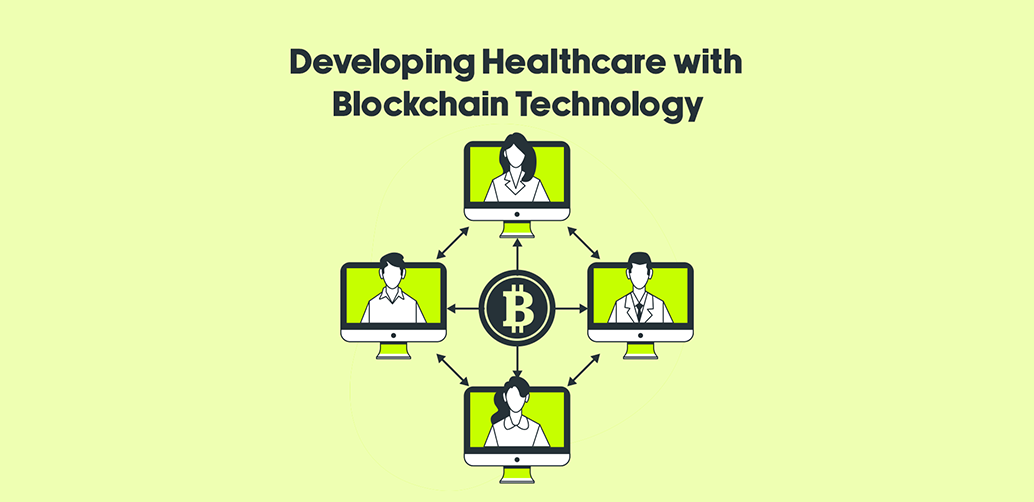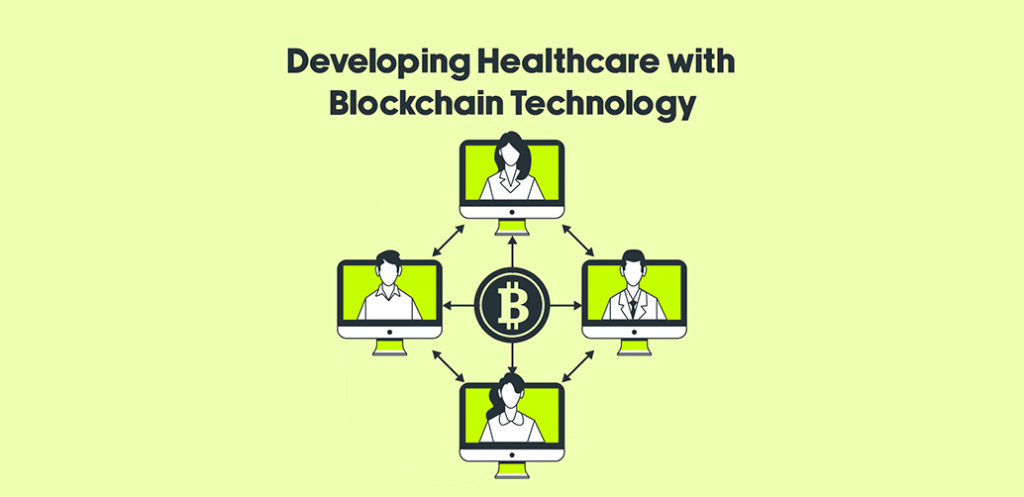The healthcare industry has been witnessing the rise of several technologies and their implementation in the past decade with the only goal of healthcare system improvement and enhanced patient care. Blockchain technology is a similar advanced technology that has high potential to shape the existing healthcare systems into a more patient-centric model. The blockchain in healthcare can be explained as a widespread technology that has the purpose of storing and recording all kinds of transactional records. Thus blockchain is like an advanced record system that keeps the files of all peer-to-peer transactions that are built from transaction blocks linked together.
There remains a digital ledger in the block system where all these records can be found to be stored in an organized pattern. The blockchain works in an immutable pattern without any skips or pauses in a secured storing format allowing easy exchanges of data as well. Oftentimes the need for professional transactions arise where pre-existing trust doesn’t remain between the parties, this can be easily handled by the cryptographic techniques of blockchain. In blockchain technology, there isn’t any dominance hierarchy and the stored records are accessible to all the network participants with the proper distribution. The blockchain system is highly transparent and any interaction with the system by one user is known to all the participants. For security maintenance, verification of the user is required for the addition of information. This allows easy collaboration across various participants without any risk of information theft or loss.
Blockchain has been used across various industries where improvements in security, quality, and documentation processing were required. The patient records are sensitive to handling and require an organized and efficient form of storage that also makes tracking of a record or asset much simpler. The blockchain is thus implemented into the electronic health records of hospitals and healthcare organizations for getting enhanced security, higher speed, and a much simpler process of access in a unified form. Each recorded transaction in the blockchain is treated as a block that later on provides inputs based on multiple parameters pre-determined.
Blockchain in the health sector has been often compared to the electronic health records use which appears like a system with a similar purpose. It has been witnessed that the number of considerations is much lower in comparison as blockchains have properties like self-sustainability and private management. Blockchain technology is also capable of improving the hospital’s quality of care by providing utmost transparency in the records along with immutable documentation. Through blockchain, every single patient encounter is accurately logged with the exact time of consultation which leads to documents being sustainable and matching with the compliance measures. The blockchain has many advanced applications beyond patient record handling and helps in multiple other sectors of the healthcare industry.
The need for blockchain in healthcare and its versatile benefits
In the US there have been multiple incidents of data breaches in healthcare organizations and medical facilities. Evidence has been found for many practices and treatment equipment are inefficient in functionality. The increasing treatment costs in the hospitals are also a major concern that requires improvement through the hands of modern technology and innovation. The insurance procedure is a giant aspect of the healthcare industry that requires scrutinized verification with claim settlement proceedings. Through the use of blockchain technology, the remote structures of healthcare and monitoring become more empowered and the dependency on manual data handling gets eradicated.
The biomedical research processes also get massively helped by the use of blockchain technology as there remains more than one way to implement blockchain use. The blockchain has the potential to open intense research opportunities for medical researchers by showcasing the power of medical data in a newfound way. Most the medical facilities are not open to sharing their patient records with other hospitals or healthcare organizations, as they are under a private administration the independence regarding this matter cannot be altered that easily. The prime reason for healthcare organizations to not share is the security and vulnerability of the patient’s detailed health records.
With the application of blockchain in the record and storage structure of the hospitals, it is going to be possible in providing a much safer platform for secure transfers. The decentralized storage of block technology becomes more efficient with the incorruptible feature. When it comes to a person’s identity the blockchain doesn’t act with the same transparency. Secure and complex structured codes are used in concealing the identity details of an individual who remains on one end of the record transaction. Any kind of medical information is present in its purest form when there remains no centralization between the doctors, patients, and other healthcare providers.
Healthcare leaders are giving the most priority to the security features of blockchain technology because there have been serious thefts of data between 2010 and 2018 in the healthcare industry. According to the statistical reports, millions of patient records were either stolen or exposed including crucial payment information of several patients. The genomic studies and testing records that were breached had made the extensive labor of researchers much more trivial and non-authentic. To avoid these kinds of dreadful scenarios many countries with government support have adapted to blockchain technology across their healthcare and medical organizations.
Blockchain operating process and the opportunities in the future
The operations structure of blockchains in healthcare is much similar to its structure in other industries like finance and e-commerce. The functionality of the blockchain structure highly depends on the efficient connectivity between the information ‘blocks’. When one device in a blockchain system will get involved in a transaction all the other devices connected on the same blockchain system will create the exact same blocks. Thus any kind of data transaction is going to present in the form of information blocks across all the devices present in the network. The same principle is present for other tasks like accessing data and making changes in it making blockchain have transparency which is much beyond comparison to other technologies.
Thus if all computers of a health organization are put in a common blockchain and any of them is used for tasks between manipulation, access and transfer then a new block will be created to make a record of that information. Blockchain also makes achieving data parity much easier by the comparison of all the blocks in the connected devices. The modern blockchain uses a unique feature called Hashing. The blocks are always stored in a chronological form and are supremely connected to the preceding and prior blocks. Through hashing each block receives a unique identifier that gets changed if the block’s content gets changed. The chain connection between the blocks makes a succeeding block instantly catch a hash change due to the alteration being made to the preceding block’s data.
Data mimicking and falsifying chances get drastically reduced when a healthcare organization uses blockchain technology in its daily operability. According to many statistical conclusions of Healthcare IT organizations, it has been proven that blockchain technology has low costs in comparison to other conventional data storage systems. The blockchain system does require very low maintenance and is highly sustainable. The speed of processing information into a detailed block structure is remarkable in block technology and allows high functionality for healthcare organizations and medical facilities without worrying about the pace of data storage. Most blockchain systems are capable of handling more than four thousand transactions at the same time.
The medicine supply chain and distribution have also witnessed counterfeiting and other fraudulent activities leading to the loss of billions of US dollars in the past. The blockchain has excellent tracking capabilities that can be used in the pharmaceutical and hospital drug department to establish a cleaner healthcare industry. A BIS research has highlighted the fact that if blockchain is integrated and applied in the healthcare industry with urgency then billions of dollars can be saved every year through cutting costs in support functions, IT, operations, and data theft in healthcare.
Several reputed companies like Chronicled and Curisium have come up with innovative blockchain applications in the healthcare sector that are being highly praised across the globe. The tech company called Chronicled utilizes the blockchain system in the MediLedger connection to increase the collaboration between medical institutions and trading partners. Curisium is another reputed company owned by the parent company of HealthVerity, but Curisium is dedicated to working with blockchain. Curisium has created a platform for managing contracts and rebating negotiations. Curisium also lets unique contracting arrangements occur that are highly secured and efficient in structure.
Endnote on Blockchain challenges in healthcare
Blockchain in healthcare still has some challenges in implementation which need to be tackled to obtain global acceptance in the healthcare industry. Some blockchain variants do have scalability issues and are not able to function properly when a huge number of patients are being treated and monitored at the same time. Every blockchain technology that gets used in healthcare should have data standardization rules and constraints to keep the blockchain’s performance utmost.
The standards of storing data that get defined at the time of implementation allow much smooth processing of data in blocks. Blockchain technology is much more advanced and modern, thus the healthcare staff including doctors should be aware of its benefits and operating structure. There should be trained individuals in every medical facility who will be knowing the basic user-end functions where blockchain gets implemented. Even though there remain several challenges, it can be said that blockchain technology in healthcare will receive further developments from the constant research and experimentation being carried out practically throughout the world.

 Web and Full Stack
Web and Full Stack CMS and Frameworks
CMS and Frameworks Online Marketing
Online Marketing Cloud Services
Cloud Services ECommerce
ECommerce Mobile
Mobile




